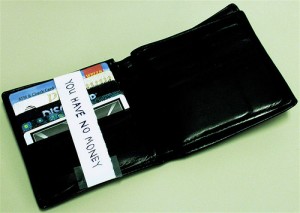I hate scammers. Whether it’s the garage-sale shoplifter, telemarketing “charities” with 99% overhead, 3-card-monte

dealers, or the guy who begs Grandma for cash every week, they all need to be strung up. Since vigilante justice is generally illegal and occasionally immoral, it’s best to just avoid the problems from the start. Here are some scams to watch out for.
Pyramid Scams – All of the little parties people throw to earn free items at the expense of their friends are pyramid schemes. Most of those are legitimate money-sinks. A few, however, exist solely to get their “consultants” to bring in more consultants. The sales aren’t the actual way to make money. If you don’t have anyone “downstream” you won’t make any money. If the focus isn’t on selling an actual product or service, but is instead on bringing in people under you, you have entered the world of pyramid scams. Generally illegal and always immoral. Don’t sign up and, if you do, don’t ask me to participate.
Advance Fees and Expensive Prizes – If you win a contest and you are expected to send money to claim your prize, it is a scam. You don’t have to pay sales tax in advance. You don’t have to pay transfer fees. Real prizes are delivered free, accompanied by a 1099, because prizes are income. No prize requires pre-payment. No loan service requires “finder’s fees”. If it doesn’t sound right, don’t pay it and certainly don’t give your bank information to anyone you can’t verify.
Work at Home – The most common work-at-home job I’ve found is stuffing envelopes. You see the signs on telephone poles all over the city. “Make $10/hour stuffing envelopes from the comfort of your own home! Just send $50 to….” When you get the instructions, you are told to hand up signs telling people to send you $50 for instructions on how to make $10/hour stuffing envelopes. Everybody is feeding off of everybody else.
Charity – Never give money to a charity over the phone. Always take the time to verify where you are sending your money. Some freak may call to tug on your heartstrings with a sob story, but you don’t have to give them money. At least ask them to send it in writing so you can do some checking, first.
Phishing – Simply put, don’t click on any link in any email, unless you know where it is going. If it is a link to a financial institution, go enter the address into the address bar yourself. If you find yourself on a site you don’t recognize, don’t give them your personal information and don’t ever reuse your usernames and passwords. If you do, one bad site could get access to everything you do online.
[ad name=”inlineleft”]Foreign Lottery – To be clear, Spain did not just hold a international lottery and randomly draw your email address. No lottery in the world works that way. If you didn’t enter the lottery while you were in Spain, you aren’t going to win it. The scam is that you need to provide your bank information, including a number of release forms so the scammers can transfer money to you. In reality, you are signing over control of your account and will be wiped out.
Nigerian/419 Emails – Ex-Prince WhateverHisNameIs wants your help to get his fortune out of WhereverHeIsFrom. The New Widow Ima F. Raud has an inheritence that she won’t live long enough to spend. They’ve both been given your name as a trustworthy person to handle the transactions in exchange for a mere $10 million. What friends do you have that would make this seem legitimate? Once again, they will get your bank information and take your money. At a minimum, they will try to get you to pay a few thousand dollars for “Transfer fees”. Don’t do it.
Overpayment by Wire – I had this one attempted on my last week. You sell something online. A potential buyer agrees to purchase the item, sight-unseen. They’ll send a cashier’s check and, after it clears, one of their agents will pick it up. Unfortunately, the buyer’s secretary screwed up and added a zero to the check. Would you mind wiring the overpayment back, minus a small fee for the hassle? The check is bogus and there is no way to verify it. You’ll deposit the check and it will be assumed to be real. The bank will make the funds available well before it comes back as fraud. You’ll see the available funds and send the money by non-refundable Western Union and some thug in Nigeria gets a new iPhone.
Foreclosure Scams – Some scammers try to prey on the vulnerable because they are, well, vulnerable. If you are facing foreclosure, be very careful about where you turn for help. One scam is to get you to sign over your home “temporarily” to clear the title. That doesn’t work, but you won’t find that out until you are handed an eviction notice and told you still owe the money.
Stranded Friends – You get an email from a friend saying he’s in London/Moscow/Sydney/Wherever, and he’s been mugged. He’s got nothing and needs $2500 to get home. Can you help? Do you really have friends close enough to ask for a $2500 international bailout, but not so close they tell you about the vacation ahead of time? Would they really be too timid to call you collect instead of begging for change to use an internet cafe?

 budget” width=”300″ height=”213″ />We are almost following his
budget” width=”300″ height=”213″ />We are almost following his 



